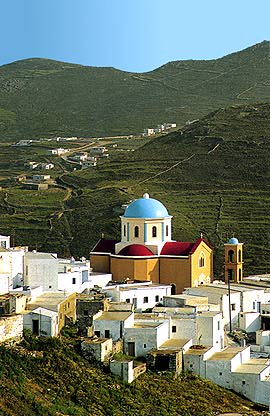|
|
Serifos Island
 Five
hours on a ferry or two and a half hours on a
hydrofoil is a small price to pay as your vessel
glides into the port of Livadi and you catch your
first glimpse of the towering hills of Serifos
flecked with the white, sugar-cubed houses of
Hora. The sight deserves to adorn the front cover
of any Greek Island guide book and will act as a
magnet to any half serious photographer. Five
hours on a ferry or two and a half hours on a
hydrofoil is a small price to pay as your vessel
glides into the port of Livadi and you catch your
first glimpse of the towering hills of Serifos
flecked with the white, sugar-cubed houses of
Hora. The sight deserves to adorn the front cover
of any Greek Island guide book and will act as a
magnet to any half serious photographer.
The beaches
on Serifos are excellent. The main swath of sand and shingle
in Livadi bay itself seems the most impressive from the sea
but is in fact put to shame by the magnificent beach of Psilli
Ammos, about 2kms to the east of Livadi. Here, the softest,
whitest sand beckons and 2 tavernas complete what is idyllic
location.
The
attraction of Livadi lies in its compactness and its
unpretentiousness. Simple tavernas offer extremely tasty fare
and everything is no more than 10 minutes' walk from
everything else. We consider Serifos to be the perfect place
to relax and unwind.
History: Serifos
is the third island of the Cyclades and lies between Kithnos
and Sifnos about 7.5 miles away from each. Its shape is almost
circular and it has a diameter of 6 miles. The ground is
barren and mountainous. Its shores are clean and are
surrounded by deep sea. Hora, its capital, lies on top of a
steep hill above the port. Other villages and settlements are
Megalo Livadi, Koutalas, and Megalo Horio. Legend reports that
the mighty Perseus grew in Serifos along with his mother
Danae, after reaching the island by being put inside a box
that was thrown to the sea by Danae's father when he learned
that Perseus, the offspring of her relationship with Zeus, was
born.
The king of
Serifos Polydeukes fell in love with Danae but she denied to
reciprocate the king's love, having the Perseus's support by
her side in this. According to the saga of Perseus, Polydeukes
sent Perseus to kill the Medusa of Serifos hoping that this
would be the last he would see or hear from him. Yet, by the
aid of gods, Perseus managed to kill the Medusa and bring the
beast's head to Polydeukes who was petrified by the sight of
it, along with everything most beautiful is the island.
Thus this
beauty has still remained and will remain forever. Since the
6th century BC, the island begins to flourish economically
mainly due to the exploitation of its mineral wealth. Serifos
became a member of the Athenian alliance and fought the
Persians in the side of Athens. Its inhabitants took part in
the naval battle of Salamis. The island was conquered
successively by the Macedonians, the Ptolemies of Egypt and
the Romans. During the Byzantine years the island declines,
while it is conquered by the Venetians in 1207. In 1537
Haeredin Barbarossa takes Serifos, while the Russian
occupation followed for 3 years. ln 1774 the Turks conquered
the island until 1821 when the Greek revolution started and
the inhabitants of the island were present and gained their
freedom along with the rest of the inhabitants of the
Cyclades.
Sightseeing's:
Hora with its marvelous view. The Castle of Gria on Koutalas.
The Taxiarch monastery.
Beaches for
swimming: The
Livadi beach which is 2 km long and sandy, Karavi, Kalo
Ampeli, Agios loannis, Agios Sostis, Psili Ammos KOUTALAS
Ganema, Vagia, SYKAMIA MEGALO LIVADI, MONASTIRI, TAXIARHON.
NUDISM: LIVADAKIA, KOUTALAS
|
>> Cyclades Islands : Amorgos, Anafi,
Andros, Antiparos,
Delos, Folegandros,
Ios, Kea,
Kimolos, Kithnos,
Koufonisia, Milos,
Mykonos, Naxos,
Paros, Santorini,
Serifos, Sifnos,
Sikinos, Syros,
Tinos.
|
|